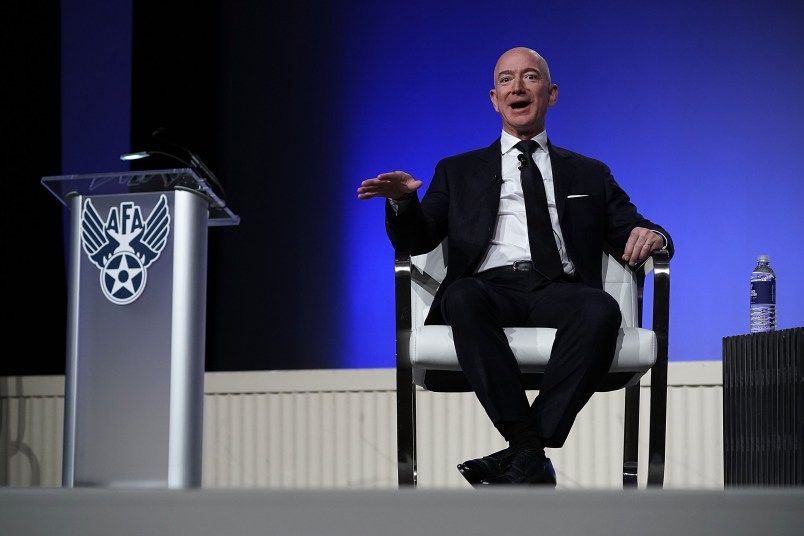It’s part of the stock in trade of liberal American discourse: threatening or claiming to cancel a subscription to this or that once-revered journalistic institution in response to bad behavior, bad reporting, failing to rise to this or that civic moment. But the rash of cancelations of The Washington Post, in response to the Bezos-driven non-endorsement seems very different, much more sizable in its scope. I should say here I’m not telling anyone to do that. I don’t like telling or pushing people to do things in general. On this whole push I’m genuinely agnostic, neither for or against it. And most importantly, I write in this case simply as an observer, not a cheerleader. But I think the brand damage to the Post may be greater even than people realize and go beyond whatever near-term hit they take on subscriptions. I want to share some thoughts on why I think that is.
A big slice of American is living in a climate of deepening bewilderment. That’s basically Blue America, civic America and the more politicized part of the group I’m describing. This bewilderment is tied to the role of billionaires in public life, the role of Donald Trump in our public life, but it goes beyond both.
The expanding story of Elon Musk is a key predicate. On one level he’s another in that history of outlandish captains of industry with crankish or malign politics. Henry Ford is an obvious analogue from a century ago. But Musk’s current role in public life goes far beyond that. He is simultaneously operating in the domains of heavy industry, communications, national security and partisan politics in a way that appears to have placed him entirely outside the bounds even of the rather limited public accountability we now feel we can expect. The revelations this week that he’s been carrying on regular communications with Vladimir Putin, discussing using his Starlink network in direct and meaningful opposition to core U.S. national security interests, simply confirms what many of us have long suspected. As one of the country’s biggest defense contractors, Musk holds high-level security clearances. The idea that he still holds those clearances and has direct operational control over critical national security technologies is simply absurd. But that confluence of power in the communications and political realms, as I said, appears to make him beyond reach. He’s now flagrantly violating federal laws against vote buying, even after a direct Department of Justice warning.
Lack of political or legal accountability for the rich and powerful certainly isn’t new information. But Musk has taken it to a genuinely new level and elevated it to the level of a kind of performance art. You can’t not see it. Just as you can’t not see that Trump is rushing around the country acting like a degenerate, fascist madman and we might be little more than a week before the country decides to return him to the presidency. This climate of bewilderment has created an intense desire among Blue American and civic-minded America, accelerating into a demand, to find people and institutions which follow the set of rules that govern how that segment of the population thinks American society is suppose to operate, how it thought it operated. And in the frenzied intensity of the final days of the 2024 election, that’s spiraled into an impatience erupting into rejection of anyone and anything that doesn’t.
It’s been suggested to me that Jeff Bezos’ decision here may be based on more than just fear. Perhaps carrots are operating in the background as well as sticks. I don’t know if that’s true. But I mention the possibility because I think it’s a critical driver of what I’ve called that climate of bewilderment. The choice has the whiff of decisions or deals made off stage, out of public view. A lot of the country is convinced that a second Trump presidency will push America into the kind of elective autocracy we see in degraded democracies like Russia, Turkey and India. That brings with it the standard package of curtailments of press and other civic freedoms. But here we see billionaires, who own press operations as side businesses, out of their back pocket, as it were, seeming to decide that it’s easier to pull up stakes in advance, get out of the way of the freight train, lay down before Trump has even won the election.
Once again, it’s out of view, off stage, a surrender in advance without even the formalities. People feel palpably not only that what they understand as the basic rules aren’t being followed, but that they are suddenly unable to track which are being followed and which are not. This creates that atmosphere of bewilderment, with much of America uncertain which rules still apply, unable to see when they’re being followed and which side people and institutions are even on. It’s all in that alternative reality of secrecy and billionairedom.
We talk a lot about a crisis of public trust in America today. But when we do we’re usually talking about Red America or what we might call Disaffected America — people lack trust in the press, in elections, in scientific or expert authority and big institutions. But there’s this other crisis of trust in institutions and people, rapidly catching up with it, that’s the province of Blue America. And Bezos, seemingly on his own not a terribly political person one way or another, has with this one decision stepped right into it, probably without even realizing it. Frankly, I am myself surprised by the intensity of the reaction. But now having seen it I think it makes perfect sense. It’s a whose-side-are-you-on moment, with sides that transcend partisan politics as most people understand the term. Bezos has rung a bell I’m not sure he can unring.






